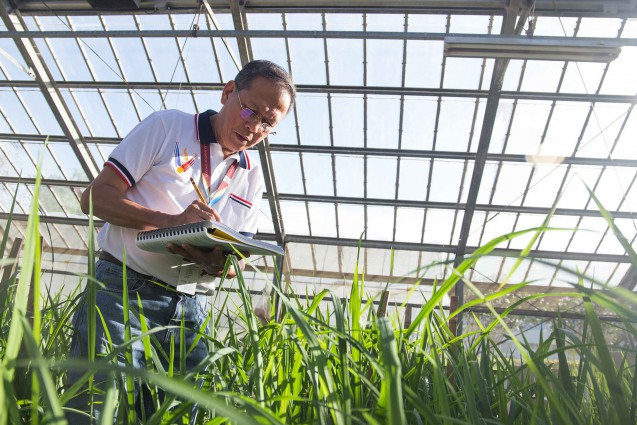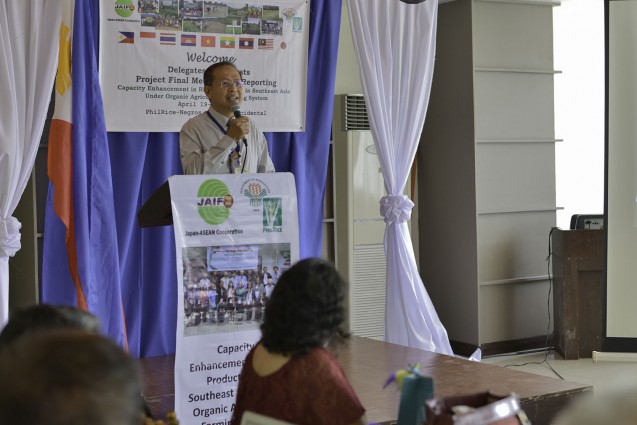Working in the agriculture research sector for 36 years now, PhilRice Scientist Dr. Norvie L. Manigbas has been involved in around 100 studies and has published widely in local and international journals. His group led the development of the first released direct-wet seeded rice variety, NSIC Rc298, which is now grown nationwide. At PhilRice, he leads projects with support and collaborators from Japan, South Korea, and eight ASEAN-member countries.
Childhood, seminary life
Doc Norvie grew up in a remote rice-farming village in San Agustin, Naujan, Oriental Mindoro. His parents are both farmers, and they lived on a minimum income. He used to earn money by helping in the farm.
At the age of seven, he was already involved in field operations such as plowing, pulling seedlings, transplanting, and taking care of livestock. Despite being active in the farm, Doc Norvie kept an eye on his dream to finish school—a shared dream with his parents. For high school, his mother enrolled him at the Saint Augustine Minor Seminary, in Calapan City.
“Discipline and studies are emphasized and strictly observed in the seminary. I am grateful for that until now. We were all taught to be time-conscious, righteous, and God-fearing,” says Doc Norvie. He did plan to pursue AB Philosophy in the seminary, but his conversation with his mother changed his plans.
With help from a priest, Doc Norvie ended up taking BS Agriculture at UPLB.
Work journey
Dr. Manigbas worked at the Plant Breeding, Genetics, and Biochemistry Division (formerly PBGB) of the International Rice Research Institute for 20 years. Most of his studies were on deepwater and submergence in rice that led to the development of many elite rice breeding lines and varieties released in Asia.
While at IRRI, he had a chance to study in Wageningen Agricultural University (WAU), The Netherlands, for a master’s degree units in crop improvement. He obtained Master in Agriculture in Agronomy at UPLB after his stint abroad through the IRRI’s staff development program.
Doc Norvie got a scholarship from the Philippine Sugar Research Institute (PHILSURIN) for his PhD at UPLB. Hence, he jumped from rice to sugarcane.
For 4 years in Negros Occidental, he was involved in developing molecular markers for sugarcane and established the first biotechnology center for sugarcane in the country. He published scientific papers on sugarcane biotechnology. He also wrote laboratory and breeding activities protocols. While at PHILSURIN, he was also stationed for a month at CIRAD, an agricultural research center working for international development in Montpellier, France to work on sugarcane molecular markers.
Owing to his desire to be with his family, he decided to move back to Luzon and work at the PhilRice Central Experiment Station in Nueva Ecija.
Plenty of opportunities have opened for Doc Norvie at PhilRice. In 2008-2010, he went on a postdoctoral fellowship at the Rural Development Administration in South Korea where he worked on rice mutagenesis, and established rapid evaluation protocols and selection for drought, UV irradiation, ozone, and hydrogen peroxide. He published 6 scientific papers in ISI journals, and one of their studies was selected as among the best 100 research studies in South Korea and won best poster award.
“I had to cut short my study in Korea as the former director of PhilRice told me that my proposed project on heat tolerance was approved and had to start immediately,” says Doc Norvie. This project was funded by the ASEAN-KOREA Cooperation with 6 ASEAN-member countries involved.
Ongoing projects
Doc Norvie is involved in quite a number of projects at the Institute. Among them is on developing heat-tolerant lines which are now at the National Cooperative Testing (NCT). This is a pioneering work at PhilRice.
He currently leads the variety development component using Korean germplasm to improve grain quality and yield. Another is on seed multiplication and distribution of Philippine cultivars in Nueva Ecija, Iloilo, and Bohol funded by Korean Program on International Agriculture (KOPIA). Farmers’ Cooperatives in these areas have already achieved more that 1M as seed money for rice production operations as a result of this project.
He also leads a project with the Micro Meteorological Instrument for Near Canopy Environment of Rice (MINCER) network with the National Institute for Agro-Environmental Sciences (NIAES) and Gifu University in Japan. This year, the project on capacity enhancement in rice production in Southeast Asia under organic agriculture system, funded by ASEA-JAPAN partnership, have already identified the right variety for organic system. Training on organic practices were implemented and seeds distributed to the farmers to start their production. A book on organic rice-based system is about to be published with him as among the authors and editors.
Academic Affiliations
Doc Norvie is serving as an affiliate professor at the Central Luzon State University for 10 years now since 2006. He is also an adjunct associate professor at the UPLB graduate school. In 2013, the Department of Science and Technology under its Scientific Career System conferred him the Scientist 1 rank.
Off the office and lab
Despite his busy life as a scientist, Doc Norvie makes sure he spends quality time with his family. They usually go to malls on weekends and stays at home or office after going to church. His colleagues at PhilRice know that Doc Norvie is a gifted musician. In fact, he is the founder and lead conductor of PhilRice’s PalayMusika Chorale Ensemble. He shows deep appreciation to classical, country, rock alternative, and old Korean love songs.






